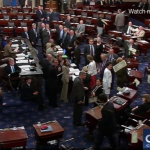Despite the soaring stock market and housing
market rebound, Americans appear to have learned their lesson about living
beyond their means.
market rebound, Americans appear to have learned their lesson about living
beyond their means.
The frugality and investing discipline that the 2008
financial crisis imposed on Americans appear to have led to permanent changes
in behavior on money matters, according to a survey by the nation’s second
largest mutual fund company.
financial crisis imposed on Americans appear to have led to permanent changes
in behavior on money matters, according to a survey by the nation’s second
largest mutual fund company.
Spendthrift ways are unlikely to again become as
pervasive as they were before the crisis, Fidelity Investments concluded
Wednesday in releasing results of its “Five Years After” survey of
nearly 1,200 investors.
pervasive as they were before the crisis, Fidelity Investments concluded
Wednesday in releasing results of its “Five Years After” survey of
nearly 1,200 investors.
Positive behaviors that appear to be now entrenched
include saving more in tax-deferred retirement accounts, paying down debt and
taking greater care to invest wisely.
include saving more in tax-deferred retirement accounts, paying down debt and
taking greater care to invest wisely.
John Sweeney, an executive vice president on retirement
and investing with Boston-based Fidelity, told the Associated Press: “People
are taking control of their financial lives, and control breeds
confidence.”
and investing with Boston-based Fidelity, told the Associated Press: “People
are taking control of their financial lives, and control breeds
confidence.”
According to AP, key survey findings include:
* 56% reported their financial outlooks changed from
feeling scared or confused at the beginning of the crisis to confident or
prepared five years later.
feeling scared or confused at the beginning of the crisis to confident or
prepared five years later.
* Survey participants estimated their household had lost
34% of the value of their total assets, on average, at the low point of the
crisis. At least 35% experienced what they considered to be a large drop in
income, and 17% said at least one head of their household lost a job.
34% of the value of their total assets, on average, at the low point of the
crisis. At least 35% experienced what they considered to be a large drop in
income, and 17% said at least one head of their household lost a job.
* 42% increased the amounts of regular contributions to
workplace savings plans, including tax-deferred retirement savings accounts or
health-savings accounts.
workplace savings plans, including tax-deferred retirement savings accounts or
health-savings accounts.
* 55% said they feel better prepared for retirement than
they were before the crisis. However, among the group of survey participants
who reported they continue to feel scared, just 34% said they’re better
prepared for retirement.
they were before the crisis. However, among the group of survey participants
who reported they continue to feel scared, just 34% said they’re better
prepared for retirement.
* 49% have decreased their amount of personal debt, with
72% having less debt now than they did pre-crisis. Just 31% of those who
indicated they’re still scared reported that they have reduced debt.
72% having less debt now than they did pre-crisis. Just 31% of those who
indicated they’re still scared reported that they have reduced debt.







